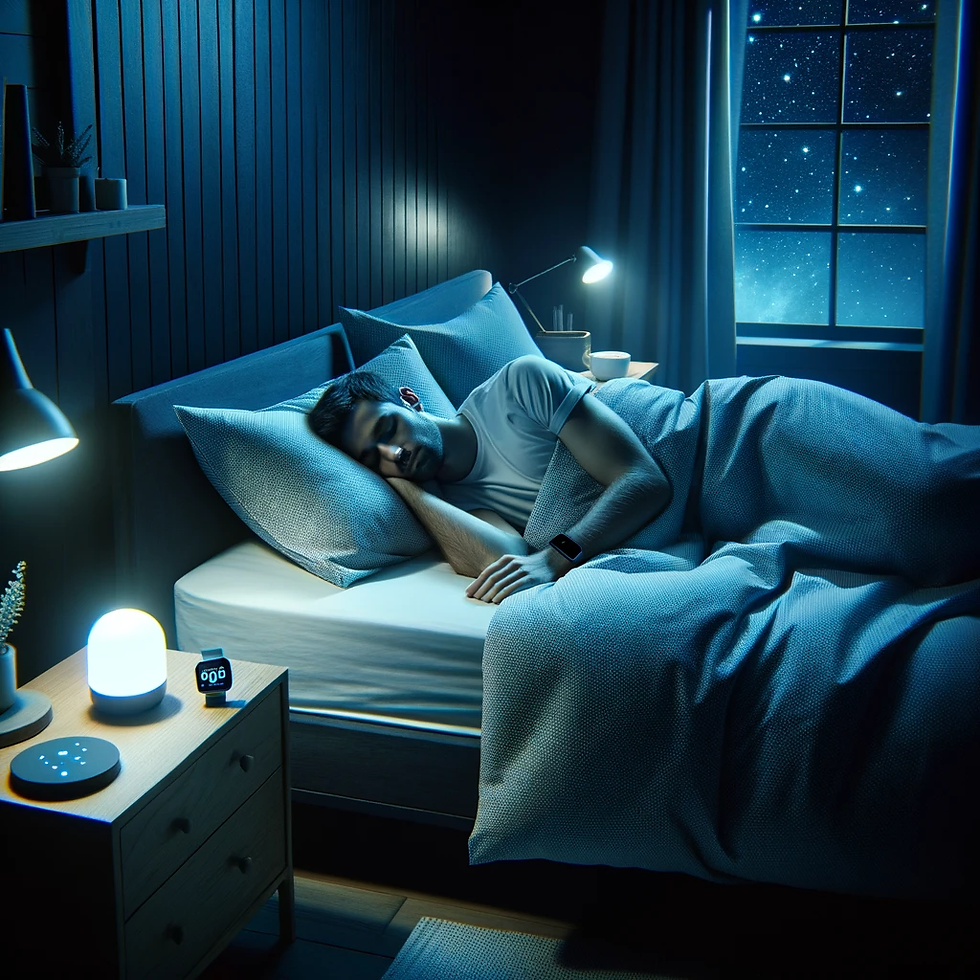GAO Report on Sleep in the Military
- Feb 10
- 4 min read
How bad do you think Sleep is in the Military?
Sleep is Life Support: A Soldier’s Descent and Redemption
Lieutenant Jake Carter stared at the radar screen, his vision blurring at the edges. His fingers, sluggish and heavy, hovered over the console, hesitating for a second too long. In that instant, the blip he had been tracking vanished—just a momentary glitch, he told himself. Or was it? His body screamed for rest, his mind teetering on the edge of coherence. But sleep was a luxury he couldn't afford. Not here. Not now.
The last time he had gotten a full night’s sleep was weeks ago. Seven hours, the Department of Defense recommended. Jake laughed at the absurdity of it. Who in the hell got seven hours in this life? Six was a miracle. Five was standard. Four? Now, that was realistic. And yet, the DOD knew the truth—sleep deprivation was as dangerous as intoxication. Jake might as well have been drunk at the controls of this multi-million-dollar system, operating in a fog that could kill him, or worse, his brothers-in-arms.
The stories whispered across the barracks were more than rumors. The pilot who nodded off mid-flight, narrowly avoiding a collision. The missileer who failed to register a critical system warning. The sailor who collapsed at his post, the exhaustion swallowing him whole. They were not tales of incompetence but casualties of a system that refused to acknowledge that fatigue was an enemy as dangerous as any battlefield threat.
A Military Running on Empty
The orders came down like clockwork, the mission tempo relentless. High-stakes operations, grueling night watches, extended shifts—Jake had lost count of the days blurring into nights, the horizon of rest always just out of reach. His body adjusted, as all soldiers’ did, adapting to a cycle of caffeine-fueled wakefulness and the occasional stolen nap. But adaptation was not survival. The human body is not a machine; it can only push so far before breaking.
And break, it did. The cracks were everywhere—17 sailors lost in the USS Fitzgerald and USS McCain collisions, a direct result of fatigue. Hundreds of millions in military equipment destroyed by exhausted operators. And yet, no systemic change. No reprieve.
Jake had seen it firsthand. The bone-deep exhaustion in his commander’s eyes, the trembling hands of a fellow soldier gripping a rifle he barely had the strength to hold. The worst part? They all knew. The leadership, the commanders, the policy makers—they all knew that sleepless soldiers were a liability. But the mission always came first, and sleep was an afterthought. Until it wasn’t.
The Breaking Point
It was 0300 when it happened. Jake was on shift, overseeing a convoy return. He had already been awake for twenty hours. The buzzing in his ears had become a constant, the weight on his eyelids unbearable. Just a second, he thought. Just a quick blink.
He never felt himself slip under.
By the time he jolted awake, the radio was alive with panic. A truck had veered off course—one of his men. The driver, a corporal barely twenty-two, had fallen asleep behind the wheel. The vehicle overturned, trapping him inside. The rescue team pulled him out with broken ribs, a concussion, and a hand that would never fully function again.
Jake had failed him. Not because he lacked skill, or knowledge, or discipline. But because he, like so many others, had been set up to fail. Because no one was protecting them from the thing that was killing them slowly.
The Road to Redemption: The Fight for Sleep
The Government Accountability Office (GAO) finally put to paper what every soldier already knew—this was a crisis. A crisis of leadership, of culture, of negligence. They outlined a solution, one that Jake could only pray would be taken seriously.
Rewriting duty schedules to guarantee eight hours of sleep. No more pretending that mission readiness could be maintained on exhaustion.
Establishing sleep trainers at the unit level. Someone who could enforce what should never have been optional in the first place.
Prioritizing sleep leadership training. Making sure the top brass understood that an army that doesn’t rest is an army that fails.
Utilizing biometrics and wearable sleep trackers. If they could monitor fatigue like they monitored weapon systems, maybe lives could be saved.
Fixing the sleep environments. Because if a Navy sailor is citing an uncomfortable mattress as a cause for failure, something is deeply, fundamentally broken.
Cutting the military’s dependence on stimulants. Soldiers shouldn’t be running on caffeine fumes to function.
For the first time in his career, Jake felt something stir—hope. It wouldn’t be easy. Cultures don’t change overnight. But maybe, just maybe, if the brass finally listened, if the policies weren’t just lip service, the next generation wouldn’t have to live like this.
Jake still had hours left in his shift. But he set an alarm. In three hours, he’d grab a nap. It wasn’t much, but it was a start.





Comments